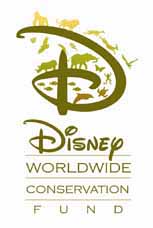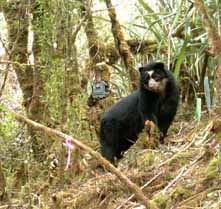Fundación Cordillera Tropical and the Carnivore Coexistence Lab at the University of Wisconsin-Madison named Disney Worldwide Conservation Fund Annual Grants Recipient
The Andean Bear Gets a Helping Hand from Disney
Cuenca, Ecuador (18 October 2011) – The Disney Worldwide Conservation Fund (DWCF) announced that Fundación Cordillera Tropical and the Carnivore Coexistence Lab at the Nelson Institute for Environmental Studies at the University of Wisconsin-Madison, USA, have been awarded an annual grant to support their project: Conservation of the Andean bear in Ecuador.

DWCF awarded two million to conservation projects around the globe in 2011, the highest amount ever contributed in a single year. Fundación Cordillera Tropical and the Carnivore Coexistence Lab are one of nearly 100 grant recipients recognized for helping to preserve habitats, protect endangered species, foster kids' connections to nature and ensure future generations can enjoy wildlife and wild places.
Project co-leaders, Lucas Achig of the Fundación Cordillera Tropical and Becky Zug, candidate for a Ph.D. at the University of Wisconsin-Madison, relate that during the first year of funding, the two groups trained ten community park guards as para-biologists to monitor wildlife , including the Andean bear. Jointly they installed motion-activated cameras to monitor ten sites within the montane forests of southern Sangay National Park.
 The Andean bear is ¨photo-captured¨ by a camera trap.
The Andean bear is ¨photo-captured¨ by a camera trap.Concurrently, the para-biologists and Fundación Cordillera Tropical staff developed an environmental education program for local schools that uses the Andean bear as a ¨focal species¨ for conservation of the region's forests and páramo grasslands. During this upcoming year, the project will incorporate new study sites into the program with the aim to increase our knowledge of the life history of the Andean bear species and incorporate these findings into the development of a cost-effective long-term monitoring protocol. The project remains committed to training para-biologists during a second year of field work as well as increasing the number of schools and communities that participate in our environmental education program.
This research and training is part of the Don Oso Program, a holistic, long-term approach to conserving the Andean bear (Tremarctos ornatus) within and near the southern boundary of Sangay National Park. The Program represents collaboration between Fundación Cordillera Tropical, the Carnivore Coexistence Lab, and communities in the Nudo del Azuay. Initiated in 2002, the Don Oso Program includes four major initiatives which engage local landowners and communities in efforts to study and protect the bear: environmental education and bear awareness; scientific research on bear biology; capacity building for locals as para-biologists; and interventions to reduce human/wildlife conflicts.
"We are grateful to the many scientists, educators and community conservationists who devote their lives to conservation and are very proud to work with our guests, fans, employees and cast members to help ensure a better future for our planet," said Dr. Beth Stevens, Senior Vice President, Disney Corporate Citizenship, Environment & Conservation.
About the Disney Worldwide Conservation
Since 1995, DWCF has awarded nearly $18 million to support conservation programs in 111 countries. Projects selected for funding must address a critical conservation need, offer education and community engagement, an ability to influence decision makers and solid scientific investigation. For a complete list of grant recipients and to view The Walt Disney Company's most recent Conservation Report, visit www.disney.com/conservation. Learn more about Disney's citizenship efforts at www.disney.com/citizenship.
About the Carnivore Coexistence Lab
The Carnivore Coexistence Lab envisions a balance between human needs and carnivore conservation worldwide. To attain this vision, we create knowledge about human-carnivore coexistence through interdisciplinary research around the world. We apply that knowledge to solve current conservation problems and share our findings with audiences worldwide. Our research follows two main streams of inquiry within the fields of Human Dimensions of Wildlife and Conservation Biology: spatial patterns of conflicts with carnivores and human responses to these conflicts, and attitudes toward carnivore management and policy:
For more information about the Carnivore Coexistence Lab, visit http://www.nelson.wisc.edu/people/treves/.
